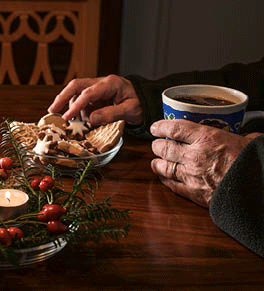How older adults can beat the holiday blues

Around the holidays, many Americans find themselves mired in feelings of sadness and even depression, especially older adults who may be coping with the loss of loved ones, their independence or beloved traditional celebrations.
COVID-19 is complicating matters for a second holiday season, but there are things seniors can do to beat the holiday blues. For one thing, it's important to understand how you are feeling and know that there is help.
About 10% of U.S. adults suffer from depression, says geriatrician Dr. Manisha Perera, who sees patients at the UCI Health SeniorHealth Center in Orange. Among seniors, that number can be much higher.
“Between 20% to 25% of older adults with chronic medical conditions, which are common among seniors, are depressed,” says Perera, who also is an assistant professor of geriatric medicine and gerontology at the UCI School of Medicine.
“Depression affects 30% to 40% of older adults hospitalized with an acute condition like a heart attack or stroke, and 50% of those who are transitioning to nursing homes,” she adds.
Holidays can trigger sadness, depression
Many people tend to feel the loss of friends and family intensely during the holidays.
“We do see an increase in depression during this time for various reasons,” Perera says. “Added to the stresses of daily life, the holidays create pressure on our time, finances and expectations of what the holidays should be.”
The impact of the pandemic has made things worse, preventing people — especially older adults — from visiting friends and family, as well as closing other avenues of social interaction such as churches and senior centers.
Many people had been expecting an improvement in social interactions with the arrival of COVID-19 vaccinations after the restrictions of the last 21 months.
“We are ready to leave all that behind, but many older adults are concerned about what this holiday season and winter will bring,” she says. “Fear over the new and highly contagious delta and omicron variants, combined with disagreements about vaccination or COVID-19 precautions can also elevate stress and anxiety.”
Symptoms to watch for
All these things can contribute to feeling low and depressed. It may be time to seek help if you are experiencing any of these common symptoms:
- Feeling so down you can’t shake it off
- Too little or too much sleep, or interruptions through the night
- Changes in appetite, eating more or less than usual
- Difficulty concentrating
- Lack of interest in the things that typically make you happy
- Irritability
- Lack of interest in socializing or engaging with others
Perera recommends reaching out to your primary care provider to discuss any of these symptoms. She also advises calling 911 if you or someone you care for is experiencing a loss of interest in living or is harming themselves.
When mourning the loss of a loved one, some people talk about their feelings with friends and other loved ones. Others prefer to keep their sorrow to themselves.
"Everyone grieves differently," she says. "But if you are feeling overwhelmed, reach out for counseling and coping strategies from a psychologist, clergy member or other trusted physician."
Beating the holiday blues
Try taking a proactive approach to staving off the holiday blues and improving your physical and mental health, Perera suggests.
Here are some strategies to consider:
- Resolve to make the best of the holidays but adjust your expectations and adopt realistic goals.
- Plan to visit relatives and friends, while taking precautions to protect your health.
- Reach out to family and friends through video calls, letters, holiday cards, emails and phone calls.
- Eat the right diet for your medical condition.
- Take a walk or just get outside for some fresh air, in addition to regular physical activity.
- Consider exploring a new activity or hobby, or teach someone else a craft you’re skilled at.
- Consider volunteering to help others who need help.
- Limit screen time. A constant diet of bad news can create a high-level of anxiety that people may not even realize they’re experiencing.
"These are examples of small changes and connections you can make that, over time, will make a difference in your outlook and overall health," says Perera.
Your holidays may look different, they can still be meaningful.
"Even if the holidays aren’t what you’d like them to be, you are not alone," she adds. "Hold your memories close but try to embrace new ways to celebrate and most importantly, be kind to yourself."
Explore further
Browse more blog posts by topic.




